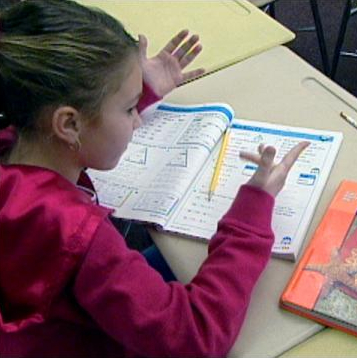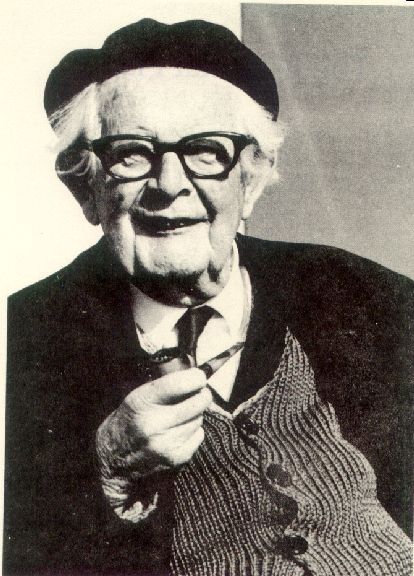What constructivist mathematics is not …
Posted by: Gary Ernest Davis on: November 5, 2010
Over at Parenting is Political, @northTOmom has written a recent post:Â THIS MATH DEPRESSES ME.
Part of what concerns @northTOmom is what she identifies as “constructivist” math.
Here is what she writes:
 “So why do I object to constructivist math? One reason is that it is, by-design, non-incremental or “spiral”: its textbooks jump around from topic to topic, never staying on a subject long enough to allow for deep understanding or competence. I also dislike reform math because it frowns upon direct instruction. Since constructivist math teachers believe children can “construct” or “discover” mathematical truths and come up with their own algorithms to solve problems, they offer students minimal guidance, and are not averse to putting the cart before the horse: e.g., assigning algebra-type problems before teaching the tools of algebra, or asking kids to divide or multiply by decimals or fractions without having first taught them how decimals and fractions work.”
“So why do I object to constructivist math? One reason is that it is, by-design, non-incremental or “spiral”: its textbooks jump around from topic to topic, never staying on a subject long enough to allow for deep understanding or competence. I also dislike reform math because it frowns upon direct instruction. Since constructivist math teachers believe children can “construct” or “discover” mathematical truths and come up with their own algorithms to solve problems, they offer students minimal guidance, and are not averse to putting the cart before the horse: e.g., assigning algebra-type problems before teaching the tools of algebra, or asking kids to divide or multiply by decimals or fractions without having first taught them how decimals and fractions work.”
I was surprised to read this because it’s not what I understand constructivist theory applied to mathematics teaching to be. In fact so far as I know, constructivist theory is a theory of learning and says little to nothing about teaching. It is a theory of how people learn, which might be very useful to teachers, but does not imply “discovery” learning.
As I recall, one of the fathers of constructivist thought, Jean Piaget remarked that it is absurd to imagine children can, or will, discover large parts of mathematics for themselves: there’s just simply too much of it, most of it thought of by mature adults.
It seems to me that part of the problem here is one of semantics compounded by the U.S. Bill of rights: every U.S. citizen feels free to use whatever words they choose in whatever way they choose to use them, without reference to previous thinkers and scholars. Such a polyglot leads to gross misunderstanding in communication, and eventually to misinformed practice as @northTOmom observes.
Constructivism in mathematics classes is not about letting children “discover” mathematics. What it is about, to a first approximation is students reflecting on their actions.
Piaget used the term “reflective abstraction”; the power of generalization and abstraction from reflecting on one’s actions. We see this for example when young children count – to 10, for example – and we ask them afterward: “When you were counting those 10 crackers, what if I gave you 2 more? How many would you have then?”
If the child already has experience in reflecting on their counting they may be able to solve this problem by imagining the objects in their mind. If not, they will probably look for 2 more crackers and count again using the real crackers.
Ernst von Glasersfeld points out that Piaget’s use of reflective abstraction as a cornerstone of a constructivist theory of learning was not original with him. Already in 1690 John Locke had observed:
“the ideas it affords being such only as the mind gets by reflecting on its own operations within itself. (Locke, 1690, Book II, 4)
So, if your child’s mathematics teacher calls themselves a constructivist teacher, ask what that means. If they mention discovery learning, and do not mention reflective abstraction as a core idea, then they either do not understand constructivism, or do not understand mathematics, or both.
Piaget’s ideas spoke to a truly experimental view of knowledge: how is that we obtain new knowledge as we make our way in the world?
Reflective abstraction is a key part of his theory of how we do that. In and of itself it has little to do with teaching, yet because it is about learning a wise teacher will look for ways to encourage students to reflect on their experiences, and to abstract and generalize from them.
Reading
Constructivism in Education, Leslie P. Steffe (Editor), Jerry Gale (Editor), Routledge (1995). ISBN: 978-0805810967
Radical Constructivism in Action: Building on the Pioneering Work of Ernst von Glasersfeld, Leslie P. Steffe (Editor), Patrick W. Thompson (Editor). Routledge (2000). ISBN: 978-0750709897
Postscript
Raymond Johnson alerted me to Lee V. Stiff’s 2001 article “Constructivist Mathematics and Unicorns“. In this article Lee gives a decent summary of constructivism and points out how opponents of certain progressive classroom practices in mathematics use the term “constructivist” pejoratively.
Many thanks Raymond for this link.
11 Responses to "What constructivist mathematics is not …"
I read not only the post that prompted your post, but these as well:
http://www.huffingtonpost.com/andrew-wolf/sputnik-screwed-up-americ_b_775617.html
http://educationnext.org/anamazeingapproachtomath/
As someone who’s studied the math wars for quite some time now, I can’t say the material is new. But it still makes me mean. Now that I’ve developing the more critical eye of a researcher, it disheartens me to see so many claims (even if they’re true) with little or no evidence or citations to back them up.
If the authors (and commenters) had really looked at the research, they’d quickly discover that education is a very messy social science. The authors of these posts only gain clarity and certainty through exaggeration and selective omission. You show me a student struggling in a “constructivist” classroom, and I’ll show you two more struggling just as much in a traditional classroom. You say Singapore and I say Netherlands. You cite fault in Everyday Math for jumping around topic to topic, and I’ll argue that Saxon books (particularly the older ones) do the same thing.
In one of my final papers this semester I’ll be addressing, among some other things, the influence of constructivsm and socio-cultural theories (particularly those of Vygotsky) on math and math education. I’ll try to get some blog posts out of the work and be sharing those in the coming couple of months.
Raymond, thank you for your comments. This post addresses one issue, briefly: What does the word “constructivist” mean?
It was not intended to be, and is not, a contribution to “math wars”.
I do know a little about the research literature – and I can always learn more.
Look forward to your posts.
Sorry about that, Gary. I got a little fired up reading the other posts and basically failed to address what you wrote. And while you may not have intended for it to be a contribution to the math wars, I saw it as a helpful one — a moment of measured sanity in response to a misappropriated idea.
As you point out, the term “constructivism” gets used and misused enough ways to make it relatively difficult to pin down. There are subtle (and sometimes not-so-subtle) variations between constructivism the epistomology, constructivism the learning theory, constructivism vs. constructionism, and constructivism applied specifically in mathematics. It’s safe to say that I’m having a difficult time sorting out the details myself, although I get the overall idea. I see that a former NCTM president tried tackling it himself: http://www.nctm.org/about/content.aspx?id=1238.
I do wonder, however, if the “traditionalists” in the math wars are all mathematical realists, whether they consciously know it or not. Perhaps some really believe there is no such thing as “constructable” mathematical thought. It’s not surprising, as the idea of knowledge being external, eternal, and unchanging goes back at least to Plato. I must admit it’s somewhat of a romantic idea to have about mathematics, even though it’s probably not be the most useful approach to take when thinking about how students might best understand it.
No problem Raymond. The “math wars” can get us a bit irritable. I would like to write in more depth about the basis of constructivism from Piaget through von Glasersfeld to others like Les Steffe (in mathematics education). Some of it is pretty heavy going and perhaps not suitable for a blog.
However, I do think it helps for people to get their terms straight when discussing these issues. It’s not just a matter of semantics: definitions and the concepts they are associated with really do matter.
I hope it’s OK for me to interject a comment here in my defence. In the last paragraph of my post I point out that the program used in my daughters’ school does not strike me as “constructivist” in any meaningful sense of the term. Nor does it seem to me to be any more “conceptual” than the way I was taught math. Yet the textbook used, albeit Canadian, is indeed based on the 1989 NCTM standards. My problem with the program is that it is defended by education officials in our province *because* it is supposedly “constructivist” and (therefore) pedagogically progressive. But in my experience it fails the only test that even the most progressive parents care about: It does not instill in kids (or in mine, at least) an enthusiasm for math. In fact, it often frustrates them and undermines their confidence.
Now, part of this may be that constructivist textbooks expect too much from teachers–perhaps they necessitate deeper mathematical understanding than most generalist elementary math teachers possess. I do believe that people with math degrees should be teaching elementary math, just as (in our board) people with music degrees teach music. But that’s a whole other can of worms.
I guess what I’m trying to say is that labeling people who oppose what passes for constructivist math “traditionalists” as a justification for dismissing their concerns, is too simplistic. I am not a traditionalist. I don’t want drill and kill or tidy rows in math or any other class. I don’t believe in a transmission model of teaching or learning. But as a parent, I think it is my right to voice my opposition to a program that I believe is simply not working. I don’t have the answers, but shouldn’t I at least be able to pose the questions?
Absolutely you should be able to pose the questions. And you should not feel you have to defend yourself. I liked your post, and I liked the issues you raise.
For me, a problem was, and is, some people using the word “constructivist” as a pejorative term, or as a praiseworthy term, without understanding the deeper meaning of the word. The education officials you refer to clearly equate “constructivist’ with “progressive”.
Frankly I do not see how a text book can be constructivist or otherwise. Constructivism is a theory of how people learn. Either it’s right or wrong, in part or in total, but people cannot “decide” to be constructivist for the purposes of writing a textbook. Not as I understand the word. It is, to me, a clear example of a technical word being misused in everyday language.
Thanks again for your original post – it got me thinking – and for your comments, which are always welcome.
@icttalk Rob Ellis writes:
@republicofmath What #constructivist #mathematics is not … I was having a panic until I got to para 2. Quite right!
I need practical examples of mathematical topics put forwarded by constructivist mathematician. Even if they are not the inventors of it, but a modification based on already existing idea from another scholar may assist me greatly. Thanks and keep me posted.
Sam
Samuel, your point about examples is a good one. I could certainly do that for mathematics education.
Bear in mind hat there is a difference between a constructivist mind-set in mathematics ( http://bit.ly/aFavAe ) and constructivism as a theory of learning ( http://bit.ly/byzVAN ). They sound similar but are quite different.



November 5, 2010 at 9:46 pm
When a student developes a method to do some number processing operation after several years of receiving poor instruction for how to do it the standard way and this student’s method works logically and sensibly, giving correct results, what do you call it? When a teacher finds this student doing this kind of operation and tells him that his method is the wrong one and should learn to do it the right way, what do you call this?
November 9, 2010 at 7:43 am
I am not sure what I would call it, but this situation is not uncommon and, in my view, leads many students to adopt a very negative view of mathematics – as if there were one and only one right way of doing things. The problem is largely one of teacher insecurity. It is a big problem because much damage can be done to sensitive and creative students. Wish I had a better answer for you.